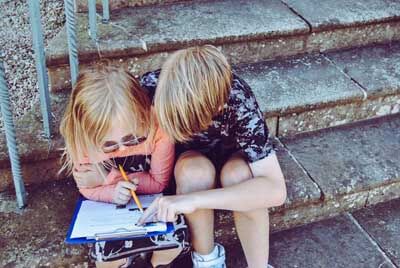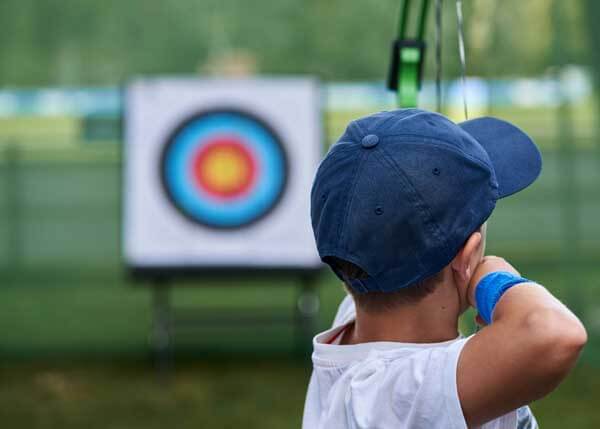Fostering Empathy Skills in Kids: Nurturing Future Success
Empathy skills in kids refer to their ability to understand and share the feelings, thoughts, and emotions of others. It involves a child's capacity to connect with and acknowledge the experiences of people around them, recognizing their joys, sorrows, and perspectives without judgment or prejudice. Empathy skills enable children to develop a sense of compassion, kindness, and the capacity to relate to others on a deeper emotional level. These skills help kids build stronger interpersonal relationships, fostering a sense of understanding and support within their social interactions.

This article explores the vital topic of empathy skills in children. It delves into the factors that contribute to the development of empathy in kids, shedding light on the role of family, environment, and early experiences. Additionally, it discusses practical ways to nurture and enhance empathy in children, emphasizing the importance of modeling empathetic behavior, teaching perspective-taking, and encouraging open communication.
Furthermore, the article touches on the long-term impact of empathy skills on a child's future opportunities, hinting at the benefits of improved relationships, effective teamwork, and enhanced social competence. By understanding the factors influencing empathy and how to cultivate it, parents, caregivers, and educators can play a crucial role in shaping a child's ability to connect with others, ultimately preparing them for a brighter future.
- Parameters and Factors Affecting Empathy in Kids
- The Impact on Life and Future Success
- Future Opportunities
- Key Aspects of Empathy Skills in Kids
- Key Components of Empathy Skills in Kids
- How to Improve Empathy Skills in Kids
- Nurturing Empathy Through Online Resources
Empathy skills in children are a cornerstone of their emotional and social development. These skills encompass the ability to understand, share, and resonate with the feelings and perspectives of others. In this article, we will explore the various aspects of empathy skills in kids, including the parameters and factors that influence them, strategies to enhance these skills, and the profound impact they have on a child's life, future success, and opportunities.
Parameters and Factors Affecting Empathy in Kids
Empathy in children is shaped by a range of parameters and factors:
1. Parental Influence: Parents play a pivotal role in modeling empathetic behavior. Children learn empathy by observing how their parents respond to others' emotions.
2. Early Experiences: Positive early experiences, such as nurturing and caring environments, contribute to the development of empathy.
3. Social Environment: Peer interactions, school environments, and exposure to diverse perspectives influence a child's ability to empathize.
4. Neurodevelopment: Brain development, particularly in areas related to social cognition, plays a role in a child's capacity for empathy.
The Impact on Life and Future Success
Empathy skills wield significant influence on a child's life trajectory:
1. Stronger Relationships: Empathetic children build healthier relationships, fostering trust and cooperation.
2. Effective Communication: They excel in communication, resolving conflicts peacefully.
3. Teamwork and Leadership: Empathy equips them for collaborative work and leadership roles.
4. Social Competence: Empathetic individuals navigate social situations adeptly, enhancing career prospects.
Future Opportunities
Empathy opens doors to a myriad of future opportunities:
1. Career Success: Empathetic professionals excel in fields requiring teamwork, leadership, and customer relations.
2. Global Citizenship: Empathy empowers individuals to be compassionate global citizens, contributing to a more harmonious world.
3. Personal Fulfillment: It leads to a more satisfying and meaningful life, as empathy nurtures a sense of purpose and connection.
Key Aspects of Empathy Skills in Kids
1. Development through Early Experiences:
Empathy skills in children begin to take shape during their formative years. Early experiences, such as interactions with parents, caregivers, and peers, play a fundamental role in shaping these skills. Children exposed to nurturing, caring, and emotionally supportive environments are more likely to develop empathy.
2. Parental Guidance and Modeling:
Parents are primary influencers in a child's journey towards empathy. Children learn by observing their parents' reactions to emotions and social situations. When parents model empathetic behavior by showing understanding and support, it sets a powerful example for their children to follow.
3. Social Environment and Peer Interactions:
The social environment a child is exposed to, including school and community settings, significantly impacts the development of empathy. Peer interactions teach children to navigate social dynamics, understand different perspectives, and respond to a wide range of emotions.
4. Neurodevelopment and Brain Maturation:
Empathy is closely linked to brain development, particularly in regions associated with social cognition. As children's brains mature, their capacity for understanding and processing emotions in themselves and others also grows. This neurodevelopmental aspect is a key factor in the emergence of empathy skills.
Key Components of Empathy Skills in Kids
1. Recognizing Emotions:
Understanding emotions, whether in oneself or in others, is a crucial part of empathy. Children need to learn how to recognize different feelings like happiness, sadness, anger, and fear so they can respond with empathy.
2. Active Listening:
Being a good listener means giving your full attention to what someone is saying, both through their words and their body language. It's important for children to practice listening carefully to others so they can truly grasp how others are feeling and what they might require. You can explore this further in the article "Unlocking the Power of Active Listening Skills in Children".
3. Perspective-Taking:
Perspective-taking is the ability to put oneself in another person's shoes and see a situation from their viewpoint. This component of empathy encourages children to consider how others might be feeling or thinking in a given situation.
4. Emotion Regulation:
Empathetic individuals can manage their own emotions effectively, which is crucial for providing support to others. Children should learn to regulate their own emotional responses so that they can be a source of comfort when needed.
5. Expressing Empathy:
Empathy isn't only about understanding; it's also about letting others know you understand and care. Teaching kids how to express empathy through what they say and do is important for forming strong connections with people.
6. Caring and Selflessness:
Caring goes beyond empathy. It means truly caring about how others are doing. When we encourage children to do kind things for others without expecting anything in return, like helping someone in need, it's called altruism. These acts of kindness show that their empathy is turning into actions that make a good difference in other people's lives.
7. Conflict Resolution:
Empathetic children are better equipped to resolve conflicts peacefully. They can empathize with both sides of a dispute and find solutions that consider everyone's feelings and needs.
8. Cultural Sensitivity:
Empathy should extend beyond one's immediate social circle. Teaching children about cultural diversity and the importance of respecting and understanding different cultural perspectives fosters empathy on a broader scale.
9. Self-Reflection:
Promoting self-reflection in children about their own emotions and experiences is pivotal in the development of empathy. When children gain insight into their own feelings, it equips them to connect more deeply with others who might be experiencing similar emotions.
10. Empathy as a Core Value:
Instilling empathy as a core value in a child's belief system is essential. Emphasize that empathy is not just a skill but a fundamental principle that guides their interactions and relationships with others.
Empathy skills in children include different important parts like understanding feelings, listening actively, seeing from others' points of view, and being aware of different cultures. When we help kids grow these parts, we can make them kind, understanding, and good at interacting with others. This way, they can make their communities better and have better chances in the future.
How to Improve Empathy Skills in Kids
Enhancing empathy in children involves deliberate efforts:
1. Model Empathy: Children learn best by example. As parents, caregivers, or educators, demonstrating empathy in your own interactions provides a powerful template for children to follow. Show empathy in your responses to their emotions and situations. For instance, if a child is upset about a bad grade, say something like, "I understand you must be feeling disappointed. Let's discuss possible ways we can offer assistance."
2. Teach Perspective-Taking:
a. Storytelling: Share stories or books that feature characters from diverse backgrounds or with differing viewpoints. Discuss how these characters might be feeling and why.
b. Role-Playing: Engage in role-playing scenarios where you and the child take on different roles. This helps them practice seeing situations from another person's perspective.
c. "What If" Scenarios: Pose hypothetical situations and ask the child how they think different people involved might feel or what they might need. This encourages them to consider multiple viewpoints.
3. Encourage Open Communication:
a. Active Listening: Teach children to listen actively when others talk. Encourage them to make eye contact, nod, and ask questions to show they are engaged.
b. Validation: Validate their emotions, even if you don't agree with their perspective. Phrases like, "I can see why you feel that way" or "Your feelings are important" help them feel heard.
c. Emotion Identification: Help children identify their own emotions and those of others. Use emotion cards or charts to label feelings.
4. Volunteer and Community Involvement:
a. Volunteer Together: Engage in volunteer activities as a family. This allows children to see firsthand the challenges faced by others and develop empathy.
b. Discuss Experiences: After volunteering, have conversations about the people you helped. Ask questions like, "What emotions do you think they might be experiencing? How can we continue to support them?"
5. Encourage Empathetic Play:
a. Role-Playing Games: Encourage games or activities where children take on roles that require empathy, like playing a doctor comforting a patient or a teacher helping a student.
b. Dolls and Toys: Use dolls or action figures to enact scenarios where emotions and empathy come into play. This can be particularly effective with younger children.
6. Teach Conflict Resolution:
a. Empathetic Problem-Solving: When conflicts arise, guide children in finding solutions that consider everyone's feelings and needs. Encourage compromise and empathy in resolving disputes.
7. Foster Empathy through Literature and Media:
a. Books and Movies: Select books and movies that portray characters facing various emotional challenges. Discuss the characters' emotions and dilemmas.
b. Media Literacy: When watching TV shows or movies, talk about how characters' actions might affect others and what they could have done differently.
8. Positive Reinforcement:
a. Praise Empathetic Behavior: Recognize and praise instances when children show empathy. Reinforce the idea that being kind and understanding is a positive trait.
9. Be Patient: Developing empathy is a gradual process. Understand that children may not consistently exhibit empathetic behavior, and there will be setbacks. Encourage their efforts and provide guidance when needed.
10. Cultivate a Culture of Empathy:
a. Family Values: Make empathy a core family value. Discuss its importance and how it contributes to a loving and supportive family environment.
b. Empathy in Discipline: When disciplining, focus on teaching empathy rather than punishment. Encourage the child to consider the impact of their actions on others.
Nurturing empathy skills in kids involves a holistic approach that encompasses modeling, active teaching, and creating an empathetic environment. By consistently reinforcing empathy in various aspects of a child's life, we can help them develop this essential skill that will not only enhance their relationships but also contribute to their personal growth and future success.
Nurturing Empathy Through Online Resources
In today's digital age, there is a wealth of online tools and resources available to assist parents, caregivers, and educators in nurturing empathy skills in children.
1. Roots of Empathy:
This evidence-based program offers a range of resources and materials for educators, parents, and caregivers to help children develop empathy.
2. Teaching Tolerance:
Teaching Tolerance provides a wealth of free resources, lesson plans, and activities that promote empathy, tolerance, and social justice in schools and at home.
3. Emotional Intelligence App by RULER:
RULER offers an app designed to help children and adults improve their emotional intelligence and empathy skills through various activities and exercises.
4. Sesame Street in Communities:
Sesame Street provides a range of online resources, videos, and activities that focus on social and emotional development, including empathy.
These tools and resources, can play a significant role in nurturing empathy skills in children and helping them develop into compassionate and empathetic individuals.
Fostering empathy skills in children is a vital endeavor with far-reaching benefits. Through a combination of online and offline tools and resources, as well as the nurturing guidance of parents, caregivers, and educators, we can help children develop this essential quality.
Empathy not only enhances their relationships and social interactions but also equips them with valuable life skills. It allows them to navigate the complexities of human emotions, resolve conflicts peacefully, and contribute positively to their communities.
In a world that can sometimes seem disconnected, teaching empathy offers a ray of hope for a brighter and more compassionate future. As we empower our children to understand, relate to, and support others, we are sowing the seeds for a world filled with understanding, kindness, and empathy. So, let us continue to nurture empathy in our children, for in doing so, we are shaping a better world for all.
Dive into the wealth of knowledge within "44 Essential Kids' Skills: Fueling Future Success and Opportunities", where we unfold the key abilities essential for your child's overall development.
Written by: Administrator
Published on:
Last updated on:
You May Also Like:
Post a Comment
Join the conversation and share your thoughts on this article. Your comments add depth and perspective to our content, fostering a rich exchange of ideas.













